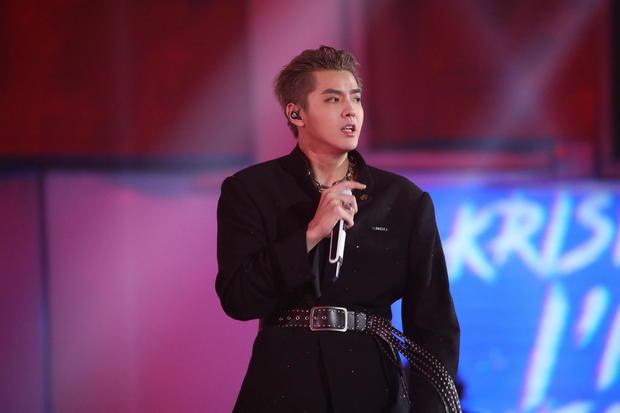Chinese-Canadian pop star Kris Wu sentenced to 13 years in prison for rape, other charges
Kris Wu #KrisWu

A Chinese court on Friday sentenced Chinese-Canadian pop star Kris Wu to 13 years in prison on charges including rape.
Beijing’s Chaoyang District Court said Wu was given 11 years and 6 months for a 2020 rape, and 1 year and 10 months for the “crime of assembling a crowd to engage in sexual promiscuity” in a 2018 event in which he and others allegedly assaulted two women they had gotten drunk.
 Singer Kris Wu performs on the stage during 2020 Pinduoduo Double 11 Shopping Festival Gala on November 10, 2020 in Changsha, Hunan Province of China. VCG/VCG via Getty Images
Singer Kris Wu performs on the stage during 2020 Pinduoduo Double 11 Shopping Festival Gala on November 10, 2020 in Changsha, Hunan Province of China. VCG/VCG via Getty Images
The court said the three victims in the rape case had also been drunk and were unable to consent.
It said a combined 13-year sentence was agreed on and Wu would be immediately deported after serving his time.
“According to the facts … the nature, circumstances and harmful consequences of the crime, the court made the above judgment,” the court said in an online statement.
A Canadian diplomat was in court to hear the sentencing, it said.
Wu was also slapped with a fine of 600 million yuan ($83.7 million) for evading taxes by massively underreporting his earnings from performances, advertisements and other sources of income.
Wu “used a fake business to convert the nature of his income and falsely declare it, and evaded 95 million yuan of tax by concealing personal income through multiple domestic and overseas affiliated companies,” state news agency Xinhua reported.
The June trial of the 32-year-old former member of the South Korean group EXO was closed to the public to protect the victims’ privacy.
Wu has been detained since August 2021 while police conducted an investigation in response to comments online that he “repeatedly lured young women” to have sex, according to a police statement at that time.
That year, a teenager accused him of having sex with her while she was drunk. Wu, known in Chinese as Wu Yifan, denied the accusation.
The teenager then said seven other women contacted her to say Wu seduced them with promises of jobs and other opportunities. She said some were under 18.
Rape is punishable by three to 10 years in prison, although exceptional cases can result in harsher sentences up to death. The second charge Wu faced is punishable by up to five years in prison.
Wu grew up in Guangzhou in China and in Vancouver, British Columbia.
Wu was previously one of China’s most bankable stars, but brands including Louis Vuitton, Bulgari, L’Oreal Men and Porsche suspended their partnerships with him over the case.
And more victims spoke out online in the wake of the initial claims, accusing Wu’s staff of predatory behavior including inviting them to boozy karaoke parties.
The hashtags “girls help girls”, “girls helping girls” and “girls help girls time” — where women expressed solidarity with Du — were censored from Chinese social media in the wake of the scandal.
The Weibo trending hashtag “the law is the lowest standard of morals” also racked up 830 million views, as users complained about the high legal threshold required for victims to prove sexual assault in court.
China’s #MeToo movement
The saga around Wu evoked China’s embattled #MeToo movement, which saw a wave of women come forward in 2018 voicing experiences of sexual harassment — sometimes involving powerful public figures.
Beijing moved decisively to suppress the feminist movement, arresting dozens of student activists in a show of its zero-tolerance approach to those deemed potential threats to its control.
A landmark case brought by screenwriter Zhou Xiaoxuan against high-profile TV presenter Zhu Jun was dismissed last year, with a Beijing court also throwing out an appeal this August.
And while tennis star Peng Shuai’s allegations of sexual assault against a senior Communist Party politician sparked an international outcry last year, her claims were swiftly censored within China.
Peng later denied making the accusation.
Wu’s case was at the center of a sweeping government crackdown on celebrity culture that took hold last summer.
Around the same time as his arrest, top actress Zheng Shuang was hit with a $46 million tax evasion fine while references to film star Zhao Wei were wiped from video streaming sites.
Authorities said they were targeting unhealthy values and “abnormal aesthetics”, ordering broadcasters to cut reality talent shows and stop giving airtime to “sissy” men and “vulgar influencers”.
Critics have argued that the moves also aimed to enhance the Communist Party’s ideological control and curb external influences that could pose a threat to its rule.
AFP contributed to this report.
More